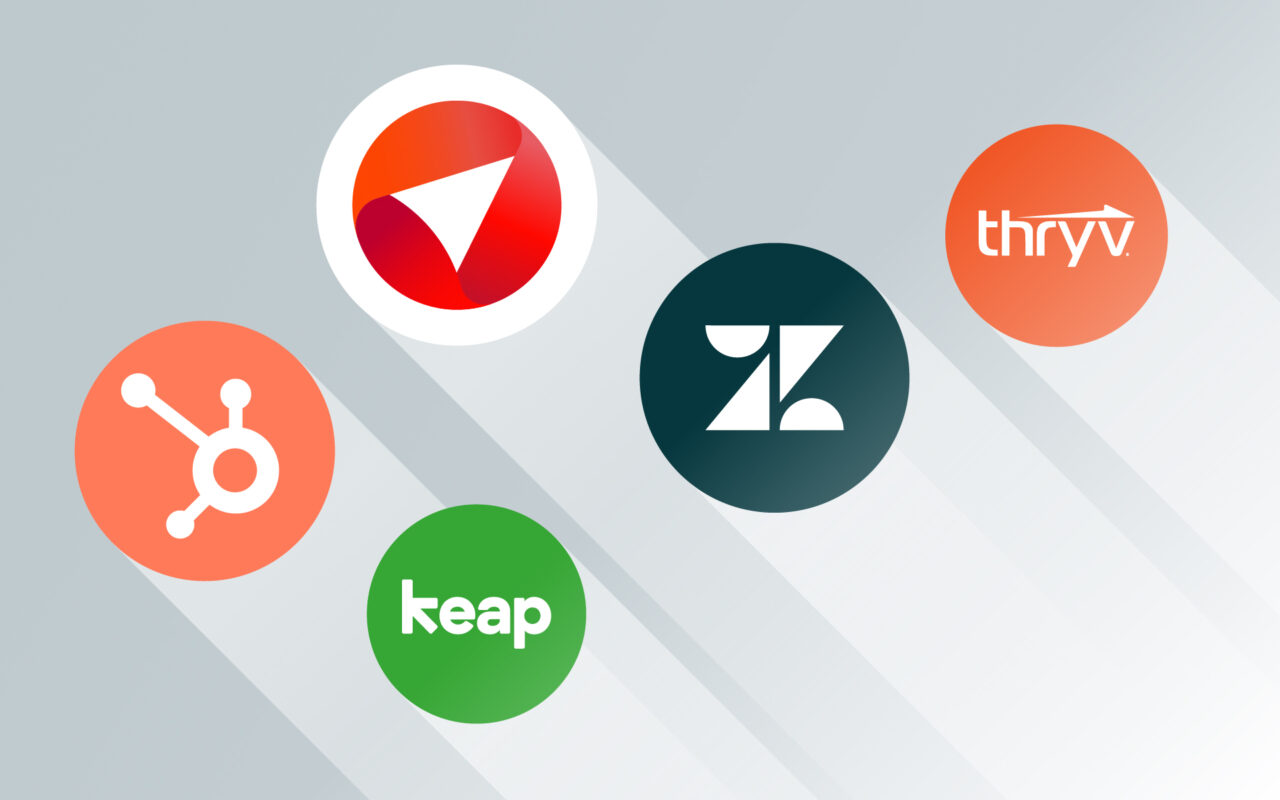The manufacturing sector in 2023 presents a web of intricate challenges, ranging from supply chain complexities to meeting shifting global demands. At its core, the goal remains consistent: manufacture quality products efficiently, and respond promptly to market needs.

The manufacturing industry can accomplish this objective by using CRM software. Suppliers and buyers are able to communicate seamlessly, departmental communication is smoother, and order management is flawless.
Beyond mere customer interactions, these CRM solutions cater to the sector's unique dynamics, optimize operations, and provide sharp, actionable insights. In fact, the manufacturing industry uses 6% of overall CRM.
Here are the 5 best CRMs for manufacturing this year. We will also focus on Outlook-integrated eWay-CRM and its transformative impact on manufacturing businesses.
Criteria for Evaluating CRM for Manufacturing
The manufacturing industry, with its complex supply chains, diverse customer base, and intricate production processes, requires robust and effective CRM solutions. While generic CRM systems might have features beneficial for a range of businesses, the manufacturing sector has specific needs that demand specialized functionalities.
As such, when evaluating a CRM system for manufacturing, it’s crucial to look beyond generic features and understand what really matters. Here are the key criteria:
- Integration with Existing Systems: The right CRM should seamlessly integrate with ERP software and other third-party tools, ensuring a smooth flow of data across all platforms. This enables the consolidation of customer orders, production schedules, inventory levels, and sales forecasts in one centralized location.
- Customization Capabilities: Every manufacturer operates differently, depending on the nature of products, market demands, and production capacities. Hence, the ability to customize a CRM solution, from dashboards to reporting formats, is paramount. For instance, a car manufacturer might need different CRM functionalities compared to a pharmaceutical company.
- Scalability: The manufacturing industry is not static. Companies evolve, expand into new markets, diversify product ranges, or adjust to economic shifts. As such, the chosen CRM should be scalable, accommodating both current needs and future growth without requiring a complete system overhaul.
- Mobile Access and Remote Functionality: The key decision-makers in the manufacturing industry aren't always stationed at their desks. Whether they're on the shop floor, visiting suppliers, or meeting clients, having a mobile-accessible CRM ensures that vital data and functionalities are always at their fingertips.
- Security Measures: Manufacturers handle a huge amount of sensitive data, from proprietary production processes to client information. The ideal CRM must prioritize security, offering features like regular backups to protect against data breaches or losses.
- Cost and Return on Investment (ROI): While it's tempting to opt for the most feature-rich CRM, it’s essential to weigh the costs against the expected ROI. The best CRM solutions for manufacturing strike a balance between offering vital functionalities and being cost-effective in the long run.
- Collaborative Capabilities: A CRM should foster collaboration across various departments – from sales and marketing to production and logistics. Features that allow for shared calendars, task management, and real-time communication ensure that every team is aligned with organizational goals. In addition, integrations with conferencing tools such as Microsoft Teams further add to the collaborative benefits.
- Feedback and Continuous Improvement: The best CRM platforms are those that actively incorporate user feedback, constantly evolving to meet the changing demands of the manufacturing landscape.
When selecting the right CRM for manufacturing, it's not one-size-fits-all. It requires a deep understanding of both present and future organizational needs, a thorough assessment of CRM capabilities, and a commitment to continuous improvement and adaptation.
With the right criteria in mind, manufacturers can equip themselves with tools that drive efficiency, productivity, and long-term growth. Let’s now take a look at 5 best CRMs for manufacturing in 2024.
1. eWay-CRM
In the manufacturing sector, staying ahead requires a unique blend of organization, efficiency, and timely management of tasks. eWay-CRM, with its robust integration into Microsoft Outlook, proves to be an essential tool.
It bridges the gap between manufacturing needs and efficient CRM functionality, transforming your familiar Outlook environment into a potent platform for tracking sales, managing projects, and conducting strategic email marketing tailored for manufacturers.
eWay-CRM’s Synchronized Approach to Manufacturing
- Native Outlook Resemblance for Familiarity: Manufacturing processes require precision and consistency. eWay-CRM, in its look and function, mirrors Microsoft Outlook. This ensures that manufacturing teams can transition smoothly, minimizing disruptions and training times.
- Actionable Email Strategies: Within the manufacturing context, emails can convey crucial information about supplies, client orders, or vendor communications. eWay-CRM lets manufacturers tag, categorize, and convert these emails into actionable leads or production tasks, ensuring nothing slips through the cracks.
- Unified Data for Seamless Operations: Manufacturing teams need constant, updated access to contacts, vendor details, production schedules, and more. eWay-CRM syncs this data, ensuring all departments, from procurement to shipping, are on the same page.
From Basics to Advanced: How to Meet Manufacturing Demands
- Customized Modules for Manufacturing: eWay-CRM’s adaptability means it can be molded to fit manufacturing-specific needs. Whether it's inventory management basics or more complex supply chain communication management, it offers modules and functionalities tailored to the nuances of manufacturing.
- The Project Management Module optimizes complex processes into streamlined operations and ensures resources are aptly allocated for maximum productivity.
- With the Sales Module, manufacturers gain the ability to predict demand, manage client data effectively, and reduce the time between order receipt and production initiation.
- The Email Marketing Module facilitates targeted campaigns, streamlined supplier communication, and brand enhancement,
- The Contacts and Companies Module centralizes customer and supplier information, enabling swift communication and ensuring all relevant details are at the fingertips of decision-makers.
- Boosting Operational Efficiency: Time is of the essence in production cycles. eWay-CRM automates routine tasks like vendor communication follow-ups, helping manufacturers optimize production timelines and reduce downtime.
- Feedback-Driven Enhancements for the Industry: Through active engagements with manufacturing businesses, eWay-CRM refines its features, ensuring they address the real challenges faced on the factory floor and in management offices.
Affordability Tailored for Manufacturing Budgets
- Flexible Plans for Every Manufacturing Scale: Whether you're a boutique craft manufacturer or a large-scale industrial unit, eWay-CRM will provide you with scalable solutions. Start with its robust free plan, and as production scales or complexities grow, upgrade to fit the exact needs.
- Transparent Pricing for Clear Budgeting: With transparent pricing starting at $24/month/user, eWay-CRM provides an invaluable tool for manufacturers, ensuring ROI through optimized operations and enhanced client relations.
Accessibility On and Off the Factory Floor
As a manufacturing professional, you are always on the move. Be it on the factory floor or in off-site meetings. eWay-CRM’s availability on iOS, Android, and Web platforms ensures that key data and functionalities are always at your fingertips.
The Manufacturing Essence and Promise
eWay-CRM is more than a CRM; it's a dedicated ally for the manufacturing industry. Integrated with familiar tools (like Word for documentation, Excel for inventory management, Teams for communication, and Quickbooks for invoicing), it ensures that manufacturers are equipped with a comprehensive toolkit. The underlying mission? Streamlining operations, maximizing production efficiency, and keeping the manufacturing agenda organized and timely.
2. Keap CRM
As a solution originally designed for small businesses, Keap CRM offers a unique blend of user-friendliness with robust functionalities tailored to manufacturing needs.
Features:
- Automation and Workflows: Keap offers advanced automation tools, ensuring streamlined and simplified manufacturing processes.
- E-commerce Capabilities: A unified platform allowing manufacturers to manage orders, invoices, and payments.
- Customizable Dashboard: A tailored dashboard highlights essential manufacturing metrics from production rates to order fulfillment.
Considerations:
- Learning Curve: Keap's distinct interface might necessitate a shift from conventional manufacturing software, leading to an adaptation period.
- Integration Needs: Achieving complete integration with existing manufacturing systems might require supplementary tools.
- Scalability: For expansive manufacturing businesses, Keap might pose some scalability challenges. While Keap serves small to medium businesses effectively, enterprises may need to reassess their fit as they scale up.
Pricing:
- Ignite: Priced at $299/month, 2 users included.
- Grow: At $399/month, 3 users included.
- Scale: At $599/month, 5 users included.
3. Thryv
Tailored to enhance communication and collaboration, Thryv provides tools that simplify interactions across the manufacturing spectrum.
Features:
- Client Communication Tools: Efficient communication tools, covering everything from initial client orders to final delivery confirmations.
- Online Scheduling and Booking: An intuitive system for seamless coordination with stakeholders like suppliers and vendors.
- Document Storage and Sharing: Streamlined access to vital manufacturing documents such as blueprints and client orders.
Considerations:
- Mobile Limitations: Despite mobile accessibility, some of Thryv’s advanced functions might be restricted to desktop usage.
- Customization Barriers: Thryv’s generalistic approach might limit adaptability to niche manufacturing requirements.
- Specialized Tool Integration: Potential challenges might arise when integrating with specific manufacturing software.
Pricing:
- Essential Bundle: At $456 per month. Combines core tools to streamline daily operations, including local enhanced listings, tracking of up to three competitors, review management, and online call tracking.
- Growth Bundle: Priced at $610 per month, this package offers advanced tools designed to elevate your brand.
- Ultimate Bundle: At $761 per month, it provides a comprehensive suite of features optimized for businesses aiming to grow at scale.
4. Hubspot
With a reputation for comprehensive sales and marketing integration, Hubspot seamlessly unifies different business functions, making it an option for manufacturers.
Features:
- Sales and Marketing Integration: A consolidated platform catering to manufacturers venturing into varied markets.
- In-depth Analytics: Comprehensive insights into manufacturing processes, client interactions, and sales projections.
- Lead Management: Effective tracking mechanisms ensure no potential client opportunities slip through.
Considerations:
- Complexity: Hubspot’s extensive feature set can be daunting, especially for CRM newcomers.
- Third-party Integration: Not all manufacturing-focused tools might be compatible, despite Hubspot’s vast integration capabilities.
- Pricing Dynamics: As manufacturing needs escalate, so might costs, particularly with added premium features.
Pricing:
- Free Plan: Priced at $0/month, suitable for small-scale manufacturers.
- Starter Plan: At $15 per user per month, catering to medium-tier manufacturing needs.
- Professional Plan: At $100 per user per month. Advanced CRM capabilities such as custom reporting, workflows, and predictive lead scoring.
- Enterprise Plan: Starting at $150 per user per month, tailored for expansive manufacturing operations with intricate CRM necessities.
5. Zendesk Suite
Primarily recognized for its customer service prowess, Zendesk Suite offers a rich set of functionalities that, when tailored correctly, can suit the demanding needs of manufacturers.
Features:
- Multi-channel Support: Efficient communication across multiple platforms, catering to manufacturers with varied stakeholders.
- Advanced Ticketing System: Handles customer feedback, inquiries, and product-related concerns with finesse.
- Knowledge Base: A reservoir for storing and sharing crucial information, ranging from manufacturing guidelines to customer FAQs.
Considerations:
- Customer Service Focus: Zendesk, while powerful, leans heavily towards customer service, which might not perfectly align with holistic manufacturing CRM needs.
- Customization Hurdles: Adapting Zendesk Suite for specific manufacturing processes could demand added training.
- Integration Facets: Integrating with specialized manufacturing tools might necessitate additional plugins or third-party solutions.
Pricing:
- Suite Team: Priced at $69/agent/month, encapsulating foundational customer support functionalities.
- Suite Growth: At $115/agent/month.
- Suite Professional: At $149/agent/month, unveiling an expanded feature set apt for larger manufacturing frameworks.
- Suite Enterprise: At $219/agent/month.
Finding the Best CRM Software for Manufacturing
In the world of manufacturing, where precision meets strategy, the best CRM software for manufacturing becomes the compass guiding through the intricacies of operations.
While Keap CRM, Thryv, Hubspot, and Zendesk Suite are commendable tools in their own right, eWay-CRM emerges from the shadow, especially for those already anchored to the Microsoft Outlook ecosystem.
Think of eWay-CRM as the bridge between tradition and innovation - leveraging the familiarity of Outlook while introducing a suite of novel capabilities. It isn't just about tracking sales or managing contacts; it's about bringing a symphony of efficiency, adaptability, and cost-effectiveness to the manufacturing floor.
As industries shape-shift, adapt, and grow, aligning with the right tools, such as eWay-CRM, might very well be the edge manufacturers need to carve their niche in the marketplace.
Integrating your CRM with Outlook is a straightforward process, but one that holds a vast array of benefits. Learn how to do this in How To Install CRM for Outlook.











